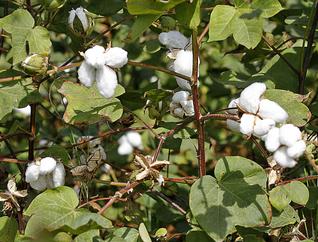Back to General Health
Texas cotton farmers turn to ‘probiotics for plants’ to help crops

By Lynn Brezosky
Published July 25, 2016
The summer heat wave is putting the super-hot agricultural technology sector’s current darling, a microbial seed coating, to a test on thousands of acres of Texas cotton.
Boston-based Indigo says its seed coating improves the water efficiency in plants and has shown 10 percent yield increases in field trials.
The company last week announced it had raised $100 million in a third round of financing from investors in what is being touted as the largest private equity financing in the agtech sector. The seeds, the company’s first commercial product, are being tested on 50,000 acres of cotton — most of it in Texas, which has the largest contiguous cotton patch in the world.
Steve Verett, executive vice president of Plains Cotton Growers, Inc., said growers welcomed anything that improved plant efficiency.
“The whole cotton area in the high rolling plains of Texas is in desperate need for a rain,” he said.
David Perry, Indigo’s CEO, described the company’s research into plant microbiomes as an offshoot to discoveries of beneficial microbes in humans, a sort of “probiotics for plants.” He sees the process as replacing microbes that have been stripped away over decades of modern farming practices.
“The human microbiome is probably the most important human health discovery in the last five or 10 years, and it was from that work that we began focusing on the plant microbiome,” Perry said. “Both humans and plants coexisted with microbes for millions or even hundreds of millions of years, and they worked beautifully to sort of support each other’s health.”
Leland “Sandy” Pierson, head of plant pathology and microbiology at Texas A&M University, said applications for beneficial microorganisms were “where we need to be moving in agriculture.”
“It’s a different way of thinking about growing crops,” he said. “What we’re looking for is the next green revolution.”
http://www.mysanantonio.com/business/article/Texas-cotton-farmers-turn-to-probiotics-for-8413660.php
COMMENT: Dr. Eisenstein said years ago that our food has half of the nutrients it did 50 years ago. It appears that probiotics are not only good at restoring our bodies, but also potentially bringing nutrients back to plants.
Published July 25, 2016
The summer heat wave is putting the super-hot agricultural technology sector’s current darling, a microbial seed coating, to a test on thousands of acres of Texas cotton.
Boston-based Indigo says its seed coating improves the water efficiency in plants and has shown 10 percent yield increases in field trials.
The company last week announced it had raised $100 million in a third round of financing from investors in what is being touted as the largest private equity financing in the agtech sector. The seeds, the company’s first commercial product, are being tested on 50,000 acres of cotton — most of it in Texas, which has the largest contiguous cotton patch in the world.
Steve Verett, executive vice president of Plains Cotton Growers, Inc., said growers welcomed anything that improved plant efficiency.
“The whole cotton area in the high rolling plains of Texas is in desperate need for a rain,” he said.
David Perry, Indigo’s CEO, described the company’s research into plant microbiomes as an offshoot to discoveries of beneficial microbes in humans, a sort of “probiotics for plants.” He sees the process as replacing microbes that have been stripped away over decades of modern farming practices.
“The human microbiome is probably the most important human health discovery in the last five or 10 years, and it was from that work that we began focusing on the plant microbiome,” Perry said. “Both humans and plants coexisted with microbes for millions or even hundreds of millions of years, and they worked beautifully to sort of support each other’s health.”
Leland “Sandy” Pierson, head of plant pathology and microbiology at Texas A&M University, said applications for beneficial microorganisms were “where we need to be moving in agriculture.”
“It’s a different way of thinking about growing crops,” he said. “What we’re looking for is the next green revolution.”
http://www.mysanantonio.com/business/article/Texas-cotton-farmers-turn-to-probiotics-for-8413660.php
COMMENT: Dr. Eisenstein said years ago that our food has half of the nutrients it did 50 years ago. It appears that probiotics are not only good at restoring our bodies, but also potentially bringing nutrients back to plants.

